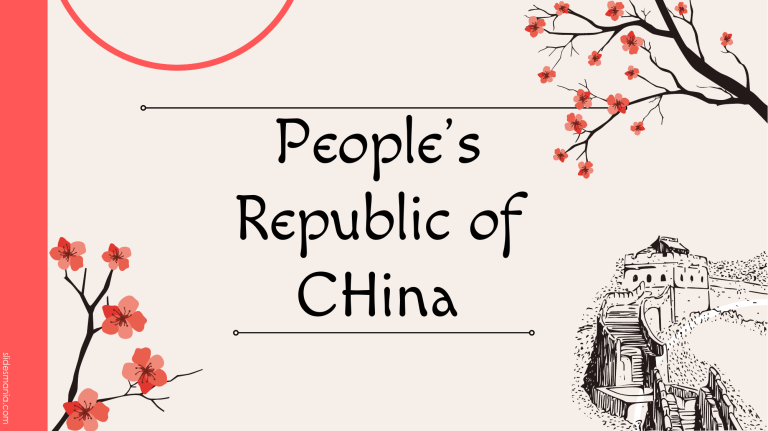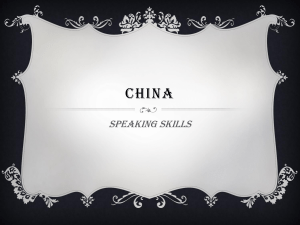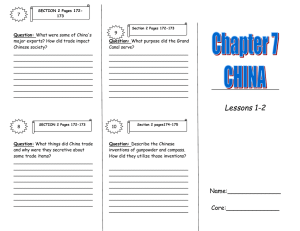
People’s Republic of CHina Introduction Hello, our names Ritesh, Bryant, Ella, Carly, & Honghua Our topic is on the PRC Table of Contents 01 Government affairs. 02 China social credit system. 03 Tiananmen Square, One child policy & Real estate crisis. 04 Foreign affairs. 05 Historical influences on modern China. Government Established On October 1, 1949, Chinese Communist leader Mao Zedong declared the creation of the People's Republic of China (PRC). Xi Jinping is the current leader since 14 March 2013. He was also the vice president between 20082013. Type of Government The government of the People's Republic of China is based on a system of people's congress within the parameters of a unitary Marxist– Leninist state, in which the ruling Chinese Communist Party (CCP) enacts its policies through people's congresses. How does it run? The Chinese constitution describes China's system of government as a "people's democratic dictatorship". The CCP has also used other terms to officially describe China's system of government including "socialist consultative democracy", and "whole-process people's democracy". Did you know? China is a unitary country, which means that its administrative divisions have only as many powers as the central government allows. China social credit system. bookie What is it? The social credit system in China is like a big scorecard that keeps track of how trustworthy or responsible people and businesses are. It is equivalent to social security but it works with complex algorithms. How does it work? It gathers information from various sources, like financial behavior, online activities, and even social interactions, to give each person and company a score. Purpose of it? This score can affect many aspects of their lives, like access to loans, travel permissions, or even the ability to get certain jobs or services. Essentially, it's a system that rewards behavior the government sees as positive and penalizes behavior it considers negative. Did you know? Caught jaywalking, don't pay a court bill, play your music too loud on the train — you could lose certain rights, such as booking a flight or train ticket. ADD Tiananmen Square, One child policy & Real estate crisis. What happened in Tiananmen Square? In 1989, Tiananmen Square was the site of the 1989 Tiananmen Square protests and massacre in which the People's Liberation Army cracked down on a student protest on the square that had the stated purpose of calling for political liberalization and greater respect for human rights, killing an unknown number of Why is it censored? The censorship is part of the Chinese government's efforts to control the narrative surrounding the events of 1989 and maintain political stability by suppressing dissenting voices. The government's position is that the protests were a "counter-revolutionary riot," and they do not tolerate public discussion or remembrance of the events. What is one child policy? The one-child policy was designed in 1980 as a temporary measure to put a brake on China's population growth and to facilitate economic growth under a planned economy that faced severe shortages of capital, natural resources, and consumer goods. It’s effect on modern society? Demographics: More old people and fewer young people, creating challenges for support systems Economy: Less young workers, impacting economic growth and putting pressure on services. Society: Changes in family structures, gender roles, and the experience of being an only child. Long-Term Impact: The policy's effects still influence China today, affecting its demographics, economy, and social dynamics. In 2021, Evergrande defaulted, representing the start of a real estate meltdown that has shaken China's economy, felled some of its biggest companies and left home buyers waiting on more than a million apartments It is crazy to think that people were paying mortgages for a house that was not even built yet. China’s real estate crisis? In China, the wealth is often reflected depending on the amount of real estate a person may have. It had become trend for people to buy houses to show off their wealth. Evergrande was using that money from home buyers to buy lands to sell more houses with the promise of building it. Real estate criss became a focal point when people stopped paying for mortgages as they never got their houses as promised. Thus resulting in Evergrande defaulting on their loans. What caused it? Did you know? China's shortage of women is increasing demand for brides among guang guan (single men). Experts estimate that by 2030, 25 percent of Chinese men in their late 30s will remain unmarried due to the missing women phenomenon. ADD Foreign Affairs China's foreign influence is a multifaceted phenomenon with economic, diplomatic, cultural, and military dimensions. It has both positive and negative implications, and the extent of China's influence is a subject of ongoing analysis and debate in international relations. China’s foreign influence? China claims sovereignty over Taiwan, considering it an integral part of its territory. The basis for this claim dates back to the Chinese Civil War (1927-1949) between the Chinese Nationalist Party (Kuomintang, or KMT) and the Chinese Communist Party (CCP). The CCP, under the leadership of Mao Zedong, emerged victorious, leading to the establishment of the People's Republic of China (PRC) on the mainland on October 1, 1949. China’s Taiwan claim? China's approach to alliances differs from that of many Western countries. Instead of formal military alliances, China tends to build strategic partnerships and cooperative relationships with various countries. Such as: ● Russia ● North Korea ● Kyrgyzstan ● Laos ● Cambodia China’s allies? The term "enemies" in the context of international relations can be sensitive, as it often implies a level of hostility that may not capture the full complexity of state-to-state relationships. Geopolitical dynamics are fluid, and the perception of relationships can change over time. However, there are instances where China has strained relations with certain countries. ● Taiwan ● United States ● India ● Japan ● South China China’s enemies? Did you know? China creates man-made islands in South China Sea to strengthen its territorial claims to the region demarcated by the "nine-dash line”. Historical influences on modern China. Ritesh Confucianism's emphasis on hierarchy, filial piety, and social order has profoundly influenced Chinese social relations. Even though its influence has fluctuated over time, its emphasis on respecting authority, family values, and social harmony continues to shape Chinese social norms. Many families tend to stay together as multigenerational home. Parents take care of the kids when they young and weak. Children take care of their parents when they are old and fragile. Social Dynamics Traditional Chinese art, with its rich heritage spanning thousands of years, continues to be a significant influence on contemporary artistic practices such as: ● Ink painting ● Calligraphy ● Porcelain and Ceramics Modern Chinese art is a dynamic fusion of tradition, innovation, societal commentary, and global influences. It's a reflection of China's complex cultural history and its ongoing dialogue with the world. Arts Throughout China's history, Buddhism has undergone phases of integration, suppression, and revival, leaving an enduring legacy that continues to shape spiritual, cultural, and philosophical dimensions in modern Chinese society. The emphasis on meditation, ethical conduct, and spiritual development resonates with many seeking buddhism as their religion. Buddhism (15.87%) Religion Did you know? National surveys conducted in the early 21st century estimated that some 80% of the population of China, which is more than a billion people, practice some kind of Chinese folk religion. Confucianism, Daoism, and Buddhism Sources: https://www.wired.co.uk/article/china-social-credit-system-explained https://en.wikipedia.org/wiki/Sexratio_imbalance_in_China#:~:text=China's%20shortage%20of%20women%20is,to%20the%20mi ssing%20women%20phenomenon. https://www.theguardian.com/world/2022/mar/21/china-has-fully-militarized-three-islands-insouth-china-sea-us-admiral-says https://www.nytimes.com/2021/09/19/business/china-evergrande-debt-protests.html https://www.pewresearch.org/religion/2023/08/30/measuring-religion-inchina/#:~:text=The%20Chinese%20government%20officially%20recognizes,are%20not%20typic ally%20considered%20zongjiao. https://www.foreignaffairs.com/articles/china/2021-11-15/chinas-search-allies https://insidestory.org.au/chinas-greatest-enemy/ THANK YOU! Do you have any questions?





